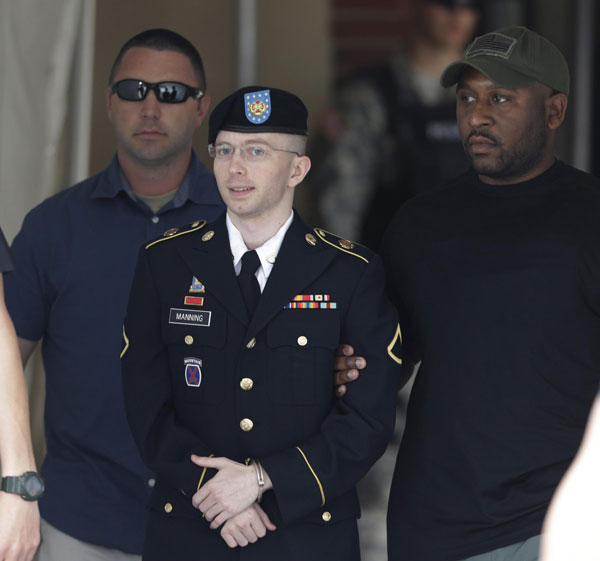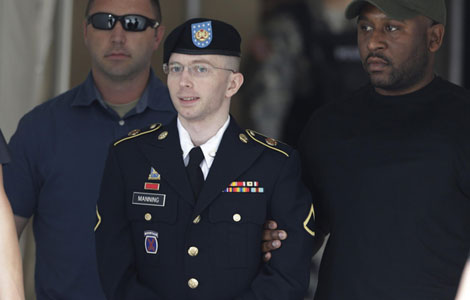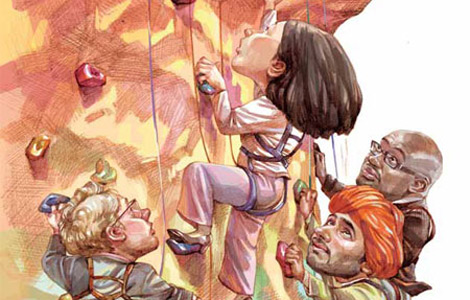Manning guilty of 20 charges, not aiding the enemy
Updated: 2013-07-31 07:52
(Agencies)
|
||||||||
FORT MEADE, Md. — In a split decision, US Army Pfc. Bradley Manning was acquitted Tuesday of aiding the enemy — the most serious charge he faced — but was convicted of espionage, theft and nearly every other count for giving secrets to WikiLeaks, a verdict that could see him spend the rest of his life in prison.
 |
|
U.S. Army Private First Class Bradley Manning (C) departs the courthouse at Fort Meade, Maryland July 30, 2013.[Photo/Agencies] |
The judge, Army Col. Denise Lind, deliberated over three days before delivering a decision that denied the government a precedent that freedom of press advocates had warned could have broad implications for leak cases and investigative journalism about national security issues.
From the courtroom to world capitals, people struggled to absorb the meaning of a ruling that cleared the soldier of a charge of aiding the enemy, which would have carried a potential life sentence, but convicted him of 20 of 22 counts that, together, could also mean life behind bars.
Manning faces up to 136 years in prison if given maximum penalties in a sentencing hearing that starts Wednesday. It is expected to last most of August.
The 25-year-old soldier stood quietly at attention in his dress uniform as the verdict was delivered, flanked by his attorneys. He appeared not to react, though his attorney, David Coombs, smiled faintly when he heard "not guilty" on the aiding the enemy charge.
When the judge was done, Coombs put his hand on Manning's back and whispered something to him, bringing a slight smile to the soldier's face.
"We won the battle, now we need to go win the war," Coombs said later, outside the courtroom. "Today is a good day, but Bradley is by no means out of the fire."
Transparency advocates and legal experts had mixed opinions on the implications for the future of leak cases and investigative journalism in the Internet age.
The advocacy group Reporters Without Borders said the verdict was a chilling warning to whistleblowers, "against whom the Obama administration has been waging an unprecedented offensive," and threatens the future of investigative journalism because intimidated sources might fall quiet.
However, another advocate of less government secrecy, Steven Aftergood of the Federation of American Scientists, questioned whether the implications will be so dire, given the extraordinary nature of the Manning case.
"This was a massive hemorrhage of government records, and it's not too surprising that it elicited a strong reaction from the government," Aftergood said.
"Most journalists are not in the business of publishing classified documents, they're in the business of reporting the news, which is not the same thing," he said. "This is not good news for journalism, but it's not the end of the world, either."
Glenn Greenwald, the journalist, commentator and former civil rights lawyer who first reported Edward Snowden's leaks of National Security Agency surveillance programs, said Manning's acquittal on the charge of aiding the enemy represented a "tiny sliver of justice."
But WikiLeaks founder Julian Assange, whose website exposed Manning's spilled US secrets to the world, saw nothing to cheer in the mixed verdict.
"It is a dangerous precedent and an example of national security extremism," he told reporters at the Ecuadorean Embassy in London, which is sheltering him. "This has never been a fair trial."
To prove aiding the enemy, prosecutors had to show Manning had "actual knowledge" the material he leaked would be seen by al-Qaida and that he had "general evil intent." They presented evidence the material fell into the hands of the terrorist group and its former leader, Osama bin Laden, but struggled to prove their assertion that Manning was an anarchist computer hacker and attention-seeking traitor.
Coombs said during trial that Manning had no way of knowing whether al-Qaida would access the secret-spilling website and a 2008 counterintelligence report showed the government itself did not know much about WikiLeaks at the time.
An aiding the enemy charge for someone who didn't directly give an adversary information is extremely rare, and prosecutors had to cite a Civil War-era court-martial of a Union soldier when they brought the charge against Manning.
"I think certainly that a conviction on that charge would have had a ripple effect," said Lisa Windsor, a retired Army colonel and former judge advocate. "I think it would have had certainly a chilling effect on anyone in the military who might decide that this is some sort of freedom of speech or whistleblower thing that they needed to engage in."
The judge did not give any reasons for her verdict from the bench, but said she would release detailed written findings. She did not say when.
Manning acknowledged giving WikiLeaks more than 700,000 battlefield reports and diplomatic cables, and video of a 2007 US helicopter attack that killed civilians in Iraq, including a Reuters news photographer and his driver. Prosecutors branded him an anarchist and traitor.
The defense portrayed the Crescent, Okla., native as a "young, naive but good-intentioned" figure. Manning said during a pretrial hearing he leaked the material to expose US military "bloodlust" and diplomatic deceitfulness but did not believe his actions would harm the country.
Besides the aiding the enemy acquittal, Manning was found not guilty of one espionage count involving his acknowledged leak of a video from a 2009 airstrike in Afghanistan. The judge found that prosecutors had not proved Manning leaked the video in late 2009. Manning said he started the leaks in February the following year.
Manning pleaded guilty earlier this year to lesser offenses that could have brought him 20 years behind bars, yet the government continued to pursue all but one of the original, more serious charges.
Rep. Howard "Buck" McKeon, R-Calif., chairman of the House Armed Services Committee, welcomed Tuesday's verdict.
"Bradley Manning endangered the security of the United States and the lives of his own comrades in uniform when he intentionally disclosed vast amounts of classified data," he said. "His conviction should stand as an example to those who are tempted to violate a sacred public trust in pursuit of notoriety, fame, or their own political agenda."
Some of Manning's supporters attended nearly every day of the two-month trial, protesting outside the Fort Meade gates wearing T-shirts with the word "truth" on them.
"I never in my heart ever thought that he was a traitor and I never thought he was trying to aid the enemy," Joe Brown of Silver Spring, Md., said outside the courtroom. "He's an American hero who saw things we did that he didn't think were right ... The killing of people unnecessarily."
The WikiLeaks case is by far the most voluminous release of classified material in US history. Manning's supporters included Pentagon Papers leaker Daniel Ellsberg, whose sensational leak of 7,000 pages of documents in the early 1970s exposed US government lies about the Vietnam War.
Reacting to Tuesday's verdict, Ellsberg said Manning's acquittal on aiding the enemy limits the chilling consequences of the WikiLeaks case on press freedoms.
"American democracy just dodged a bullet, a possibly fatal bullet," Ellsberg said. "I'm talking about the free press that I think is the life's blood of the democracy."
The material WikiLeaks began publishing in 2010 documented complaints of abuses against Iraqi detainees, a US tally of civilian deaths in Iraq, and America's weak support for the government of Tunisia — a disclosure that Manning supporters said helped trigger the Middle Eastern pro-democracy uprisings known as the Arab Spring.
Most Viewed
Editor's Picks

|

|

|

|

|

|
Today's Top News
Apple faces more staff abuse charges
Spending surge for renewables
Beijing and Canberra to resume trade talks
Top leader vows to meet growth target
2,290 disciplined for extravagance
Japan diplomat seeks to mend ties
Draft rule requires a license for dog breeding
Israelis, Palestinians to meet again
US Weekly

|

|















